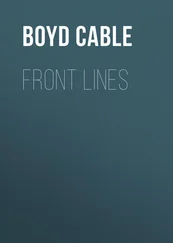Boyd Cable - Doing their Bit
Здесь есть возможность читать онлайн «Boyd Cable - Doing their Bit» — ознакомительный отрывок электронной книги совершенно бесплатно, а после прочтения отрывка купить полную версию. В некоторых случаях можно слушать аудио, скачать через торрент в формате fb2 и присутствует краткое содержание. Жанр: foreign_antique, foreign_prose, на английском языке. Описание произведения, (предисловие) а так же отзывы посетителей доступны на портале библиотеки ЛибКат.
- Название:Doing their Bit
- Автор:
- Жанр:
- Год:неизвестен
- ISBN:нет данных
- Рейтинг книги:3 / 5. Голосов: 1
-
Избранное:Добавить в избранное
- Отзывы:
-
Ваша оценка:
- 60
- 1
- 2
- 3
- 4
- 5
Doing their Bit: краткое содержание, описание и аннотация
Предлагаем к чтению аннотацию, описание, краткое содержание или предисловие (зависит от того, что написал сам автор книги «Doing their Bit»). Если вы не нашли необходимую информацию о книге — напишите в комментариях, мы постараемся отыскать её.
Doing their Bit — читать онлайн ознакомительный отрывок
Ниже представлен текст книги, разбитый по страницам. Система сохранения места последней прочитанной страницы, позволяет с удобством читать онлайн бесплатно книгу «Doing their Bit», без необходимости каждый раз заново искать на чём Вы остановились. Поставьте закладку, и сможете в любой момент перейти на страницу, на которой закончили чтение.
Интервал:
Закладка:
Doing their Bit War work at home
PREFACE
I hope that Mr. Boyd Cable’s book will have a wide circulation, both amongst our troops who will learn from it how their comrades at home are doing “their bit,” and amongst the public who will learn from it how great is the industry and devotion of those who are supplying our armies with materials of war.
D. LLOYD GEORGE.I
WORD TO THE FRONT
When I came here from the Front a couple of months ago I remember looking out from the train and thinking how quiet and normal and peaceful the country looked. Driving from the train through London, the street crowds, although flecked and tinged with khaki, appeared to be going busily or lazily about their ordinary business or laziness, the people were shopping, or walking, or driving in buses or taxis as if they personally had still no more than a newspaper interest in the war, as if fighting or munition-making were matters concerning a certain section of mankind altogether apart from the ordinary life of the country.
I know better now. My eyes have been opened, and I have seen fully and satisfyingly. There is no fighting here, thanks be, but the khaki that swarms and hives about the outer ways, and only trickles through the big towns, is evidence enough of the fighting material. And even less in evidence, because it does not wear a uniform and because its business is carried on behind closed and carefully guarded doors, the country is sweating at forge and furnace, is juggling with lathes and stamps and presses, has peeled off its coat and set to work in deadly earnest to give the Front the unlimited munitions the Front so long has wanted. It is not given to many to see what actually is being done, and to still fewer to say what they have seen, and first of all I may explain the why and wherefore of these chapters I am writing on munitions and munition-making. I am aware that very competent journalists have already covered the ground in a series of articles widely published in leading papers, and I am also aware that prominent politicians have made statements as to “increased output” and “controlled factories” and “organisation of industry,” and so on. But I am also fully aware that the Front has become exceedingly sceptical of all the facts and figures that have been paraded and of the promises that have been made for a year past. I remember how in the first winter we at the Front looked forward to the spring and listened hopefully to the tales of a flooding tide of munitions that was to help us in the Big Push. I remember how we hung on through the winter enduring the punishment that came to us because of the shortage of shells, of bombs, of trench-mortars and machine-guns; and I know how grimly the Front stuck out the punishment and hung on stubbornly with a tremendous faith that, come the spring, all would be well, that new armies would be coming along to help carry the weight, that munitions would be pouring out to help us level the long tally. And I know too well the bitter disappointment and the black rage that filled the Front when the spring came and brought us, not a plenty of munitions, but tales of a great shortage, stories of strikers and shirkers, woeful cries of a wasted winter. And when the spring dragged on into summer and the summer crawled past and brought us face to face with the certainty of another winter in the trenches – But these things are past, and, with the Front, I am glad to leave them and let bygones be bygones. But it is because of this past that I asked the Ministry of Munitions to give me an opportunity to see with my own eyes what is being done now, to give me a chance, as one of the Front themselves, to tell the Front as much as I might of what I might see, to let the Front know what I am sure the Front wants to know, what are the munition prospects for the future. The Ministry of Munitions has allowed me to look and to see, to ask questions, to talk with inspectors and managers and workers, to watch the work that is being done, and to figure out what is going to be done. And now I am going to tell the Front as fully as I may what it all amounts to. Some things that I know it would not be wise to tell, I shall not tell; but that still leaves a lot that I know the Front will be glad to hear. I hope the Front may read these chapters, and I hope the Front will tie a stone to this book and sling it over to any near-enough portion of the Hun lines, because what I have to write is so very cheerful telling for the Front to hear that it would surely be highly unpleasant for the Germans to digest.
And will the Front as it reads please remember this – that I am not writing to please or displease any person or party in politics, that I am not trying to support or injure the beliefs of any portion of the Press, that at the present time I have no interest in anything beyond the interests of the Front, that, like themselves, I only want to get on and get done with the job, and that my interest in munition-making and its prospects is the main and personal one that is so urgent at the Front – Are we going to get the stuff we want? Are we ever going to be short again?
And here, in a sentence, is the belief I have come to after a wide tour of the munition works: We ARE going to have all we ever hoped for; we are never, never, never going to be short again. I say this remembering how the size, and therefore the requirements, of the Army have increased, how much vaster in proportion to the increased Army the supplies will have to be to come up to our wants, how our fighting fronts have multiplied and grown, how also some of our Allies are still dependent upon us for some of their munitions. In spite of all these, I believe we are going to get all we want and need, if – it is the only if, although it is in a way a big enough one, and one that I’ll come back to presently – if the workers at home play up and play the game and back us up to allow us to play out ours.
If they do that, we are going to have munitions to play about with, we’re going to have a heaping plenty of shells and machine-guns and bombs and grenades and ’planes and trench-mortars.
There are enormous stacks of munitions ready and waiting now, and they are a mere handful to the munition mountains that are going to come along in ever increasing quantity month by month. You men who clung to your battered and water-logged trenches that winter while the German shells pounded them and you to pieces and our own guns were making a cruelly feeble reply, you gunners who heard the angry demands and the pitiful pleas of the suffering infantry for “retaliation” and a heavier fire and the silencing of this battery or that minnenwerfer , and had to smother your savage longing to “let ’em have it” because you were short of shells, you will understand the joy that has lately been mine to stand and look at massed rows and ranks of big fat howitzer shells awaiting shipment, to watch the wide sea of lathes whirling and buzzing, eating up length after length of steel and brass rods, turning out fuse-parts and one bit or another of weapons and projectiles, to hear store managers wonder how or where they are going to house the growing output, to be told, as I have been told time and again, that the factory is running night and day, week in week out, that the present output is to be doubled in the next month or two months, that the full volume will be reached in February or March, April or May, as the case may be. That last was perhaps the most cheery feature of a completely cheering tour – the constant assurance that larger premises were in contemplation or course of construction; that extra hands were being taken on, or sought, or trained; that further machinery was on order, or coming in, or being installed; that present output is only a beginning and is to be added to by half as much again, or to be doubled, or trebled.
Читать дальшеИнтервал:
Закладка:
Похожие книги на «Doing their Bit»
Представляем Вашему вниманию похожие книги на «Doing their Bit» списком для выбора. Мы отобрали схожую по названию и смыслу литературу в надежде предоставить читателям больше вариантов отыскать новые, интересные, ещё непрочитанные произведения.
Обсуждение, отзывы о книге «Doing their Bit» и просто собственные мнения читателей. Оставьте ваши комментарии, напишите, что Вы думаете о произведении, его смысле или главных героях. Укажите что конкретно понравилось, а что нет, и почему Вы так считаете.












